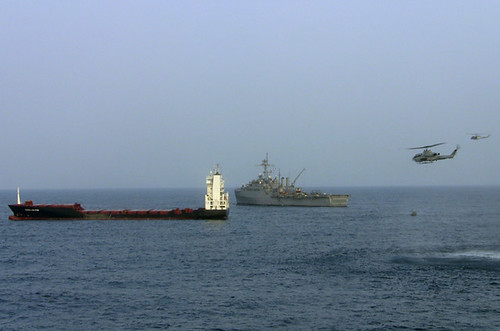
The Gulf of Aden is the focal point for imperialist occupation of the strategic waterways that represent one of the most lucrative trading lanes in the modern world. The U.S. and the EU have led flotillas of warships in the region for over two years., a photo by Pan-African News Wire File Photos on Flickr.
The Associated Press
May 15, 2012, 3:29PM
EU navy, helicopters strike pirate supply center
By ABDI GULED and SLOBODAN LEKIC MOGADISHU, Somalia
European Union naval forces in attack helicopters on Tuesday conducted their first onshore raid on a suspected pirate lair in Somalia. A pirate said the strike destroyed a supply center and set back operations.
No deaths were reported in the morning attack on Handulle village, about 18 kilometers (11 miles) north of Haradhere town, a key pirate lair. EU officials said forces did not go on land during the attack in Somalia.
The EU Naval Force announced in March that it would expand its mission to include Somalia's coast and waterways inside the country for the first time.
Bile Hussein, a pirate commander, said the attack along Somalia's central coastline destroyed speed boats, fuel depots and an arms store.
"They destroyed our equipment to ashes. It was a key supplies center for us," Hussein said. "The fuel contributed to the flames and destruction. Nothing was spared."
He said nine speed boats were destroyed, and that three of them were on standby for hijackings.
Somali government spokesman Abdirahman Omar Osman said the raid was carried out with the full knowledge of Somalia's government and it serves as a message to the pirates that they'll neither be safe at sea or on land.
Attack helicopters were used in the early morning strike on the mainland, an EU spokesman said.
The EU is the main donor to the Somali transitional government. It also trains Somali army troops, and is reinforcing the navies of five neighboring countries to enable them to counter piracy themselves. The long coastline of war-ravaged Somalia provides a perfect haven for pirate gangs preying on shipping off the East African coast.
"This action against piracy is part of a comprehensive EU approach to the crisis in Somalia, where we support a lasting political solution on land," said Michael Mann, spokesman for EU foreign policy chief Catherine Ashton.
Rear Adm. Duncan Potts, Operation Commander of the EU Naval Force, said the attack will increase the pressure and disrupt pirates' efforts to get out to sea to attack merchant shipping and dhows.
He said attacks against pirate supplies on the shoreline are an extension of disruptive actions carried out against pirate ships at sea.
Pirates have turned dangerously violent in the last few years, as spiraling ransoms attracted ruthless criminals to a trade once dominated by aggrieved local fishermen. Four Americans aboard a hijacked yacht were killed in February. It's still unclear why the hostages were shot.
As of the end of March, suspected Somali pirates still held 15 vessels and 253 crew members, with an additional 49 crew members hostage on land, according to a maritime watchdog.
In the first quarter of this year, attacks fell sharply in Somalia's waters, thanks to international naval patrols. There were 43 attacks, including nine vessel hijackings, compared with 97 attacks a year ago, the International Maritime Bureau's piracy reporting center in Kuala Lumpur said in April.
Since December 2008, the EU has kept five to 10 warships off the Horn of Africa in an operation known as Atalanta. NATO has a similar anti-piracy flotilla known as Ocean Shield, and other countries -- including the United States, India, China, Russia, and Malaysia -- also have dispatched naval vessels to patrol the region.
The EU Naval Force is responsible for the protection of World Food Program ships carrying humanitarian aid for Somalia, and the logistic support vessels of the African Union troops conducting operations there. It also monitors fishing activity off the coast of Somalia, which has been without a functioning government since 1991, when dictator Mohamed Siad Barre was overthrown.
The EU's more robust mandate for its naval force allows it for the first time to mount strikes against pirate targets on Somalia's "coastal territory and internal waters." When the policy was announced, officials said the new tactics could include using warships or their helicopters to target pirate boats moored along the shoreline, as well as land vehicles or fuel tanks used by the pirates.
The EU did not say which member nation's forces carried out Tuesday's raid.
But two months ago, the Atalanta force was joined by French amphibious assault ship Dixmude. The 21,000-ton ship, the largest to serve with the EU mission, is capable of acting as a mobile operating base for 16 choppers -- including Tigre helicopter gunships -- significantly adding to the reach of the naval force.
"Today's action is ... in line with the new mandate," Mann said. "The EU will continue to remain active in this field."
Somali President Sharif Sheikh Ahmed, speaking at the United Nations in New York, said that piracy has "damaged the name of Somalia," but the country needs to build its own security institutions to combat it.
"We have to tackle it from the ground," he said. "Any operations that take place once or twice won't have a long-term effect on the issue."
--------------
Lekic reported from Brussels, Belgium. Ron DePasquale contributed from the United Nations.
No comments:
Post a Comment